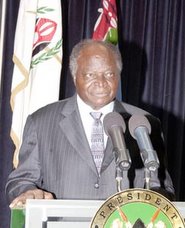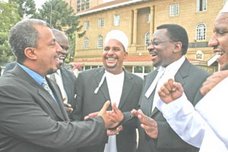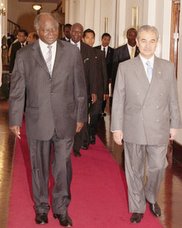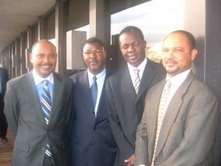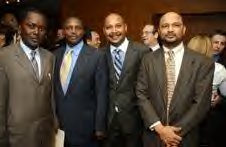Saturday, April 26, 2008
This Jacorrosi garbage deal really stinks
Any reasonably thinking individual could raise several questions. Why would the Kisauni MP Hassan Joho involve himself in municipal affairs in a business deal worth several billion shillings if he is not set to gain financially?
Why the Town Clerk Wisdom Mwamburi is defending this deal with such zeal? This column supports Tourism Minister Najib Balala in ensuring that Mombasa residents get a fair deal in the garbage collection.
What surprised me most was soon after the Mvita MP raised the issue, Mwamburi came out fighting in defense of the deal and urging it was good for Mombasa.
The Town Clerk went further and is known to have “defended the planned partnership, saying that besides offering more services, the council had started negotiations with the company before the entry of the French agency.”
This Jacorrosi Impresse deal smelled fishy to me when Mwamburi is quoted to have noted that the services would be free of charge to those who could not afford it, especially those in slum areas.
My question is who will determine who gets free service and those who won’t?
If you ask me, it will be susceptible to further corruption by the municipal officials, a cash cow for the officials.
What is it for Mwamburi and others should the Italian firm secures the contract?
If the French government has offered a more favorable plan to clean the town in a form of a grant why can’t those involved listen with the open minds for the benefit of the people?
Mwamburi is not a Mombasa native and its increasingly looking like he could care less for the people of Mombasa but his pocket.
This column supports Mayor Ahmed Mohdhar when he said: “As mayor of Mombasa, I therefore direct the town clerk to issue a fresh tender in line with current Procurement and Disposal Act 2005 and ensure that as a Council, we get value and achieve the objective of enhancing service delivery to the people with interests of the residents of Mombasa being paramount,” Mwamburi and others working on these foreign deals need to do their work and forget personal financial gains.
Many would hope that Joho did not support the election of Mayor Modhar with ulterior motive of hoping to secure kickbacks from corporations that he will assist in lobbying for them to obtain lucrative multi-million shillings municipal contracts.
I would hope that the people of Kisauni will not regret electing Joho and sent their very vocal former MP lawyer Anania Mwaboza packing. omarahmedali@gmail.com Updated on: Sunday,
___________________
Commentary & Analysis
April 27, 2008
Story by: OMAR ALI
http://www.kenyatimesonline.com/content.asp?catid=5&articleId=3166
Why Official Opposition crave is political mirage
The question of Official Opposition was a smaller fish and many of them could care less when thoughts of bigger fish occupied their minds. Take the case of the Aggrey James Orengo.
The Ugenya MP is a brilliant legal mind and one of the country’s accomplished legislators.
When participating in the negotiation table in the Mediation Talks as an ODM representative, the new Lands Minister was certain that he will land a Cabinet position once the talks succeed and as such he deliberately ignored the question of the official position in Parliament.
He was right —he is now a Cabinet Minister in the Grand Coalition Government.
I am very certain that the issue crossed his mind and he knew that with the establishment of the Grand Coalition government, there will be no Official Opposition in the National Assembly, as they were deliberately ignoring the issue from their discussions.
Budalang'i MP Ababu Namwamba, a member of ODM think tank and Pentagon House, is another brilliant legal mind and a one time respected fellow columnist, who I suspect also thought would land a Cabinet position and as such never raised the issue of the Official Opposition in Parliament.
It must be remembered that in the initial ODM list of Cabinet Ministers released by Salim Lone, ODM publicity secretary,Namwamba was to be given the Youth and Sports docket. Unlike Orengo, Namwamba was not so “lucky” for a Cabinet appointment.
When I columnist and LSK chairman Okong’o O’Mogeni and many others were raising this issue asking the National Assembly Speaker Kenneth Marende to raise to the occasion and use his wide discretionary power to facilitate the Official Opposition in Parliament through amending the "colonial parliamentary" standing orders, no ODM legislator, or any lawmaker for that matter saw the need to support us in this call.
SNow that many ODM and PNU lawmakers missed on cabinet appointments, they are on the forefront in taking up this issue seriously.
Although it is within their right to do so, but I think the matter has already be settled, not by the Speaker but by the Deputy Speaker, Farah Maalim.
Boldly speaking, I agree with the US ambassador Michael Ranneberger that those MPs seeking to be recognized as Opposition are those who missed out on Government jobs and are self serving politicians.
In the same bold speech, I totally disagree with the diplomat for opposing the calls for establishing an Grand Opposition and that Kenyans should ignore those MPs seeking to form an opposition.
The sad thing is that we shall have all the parliamentary select committees filled by PNU, ODM and ODM—Kenya cronies who will not be as effective in the role of ‘Government Watchdogs’ as they should or ought to be. Very sad, but a political reality and Kenyans have to live with it.
__________________
Commentary & Analysis
Story by: OMAR ALI
Sunday, April 27, 2008
http://www.kenyatimesonline.com/content.asp?catid=5&articleId=3165
Friday, April 25, 2008
Kenya’s diplomats doing superb job
Although the commentator deliberately ignored to substantiate any stated facts in his commentary, the reality is that when it comes to diplomats “political appointments” is an accepted norm in all democratic governments all over the world.
This phenomenon is not restricted to Kenya as Onyango tried to imply. For instance, in United States, the pricey diplomatic post is that at the United Nations, in New York.
Successful previous US top diplomats at the UN such as Mrs Magdalene Albright, and then Congressman, now Governor Bill Richardson (New Mexico) both of who ended up serving as cabinet secretaries (ministers) in the Clinton Administration were both not career diplomats.
Other famous Americans who served at the UN include Andrew Young, under President Jimmy Carter, who then went to become the mayor of Atlanta.
Taking it closer to home, the late Smith Hempstone who is one of most remembered American ambassadors to Kenya in our in recent memory was not a career diplomat but a trained journalist.
The commentary left an impression that these political appointee diplomats are the reason why, and to use his own words, “Kenya is seen to be doing badly in diplomatic circles compared to, for instance, neighbouring Tanzania…Kenya is doing badly in diplomatic postings, compared to the nations the country is competing on the continent.”
In one aspect Onyango was contradicting himself where he praised the Tanzanian UN Permanent Representative Ambassador Augustine Mahiga to be a career diplomat extraordinaire.
But like Mahiga, Kenya UN Permanent Representative Zachary Dominic Muburi-Muita is also a career diplomat with an impressive curriculum vitae.
Onyango goes to give the career histories of the two diplomats but in disguise kept on praising the Tanzanian and in one sentence he notes:
“How he rates with his Tanzanian counterpart, is a different issue,” In addition to Muburi-Muita at the UN New York, we have Franklin Esipila, a career diplomat, manning the Addis Ababa based Africa Union, while responsible for diplomatic duties in Ethiopia and Djibouti, and not to forget an academician Dr Maria Nzomo who heads our UN mission in Geneva.
Political appointees or not, Kenya has an excellent mix of career and non-career crop of diplomats and they are doing a superb job.
What the journalist forgot was the fact that our missions are staffed with well trained foreign service employees and as such it is their job responsibilities to effectively assist those head of missions in their respective stations to discharge duties for the benefit of the country.
In fact, non-career diplomats are usually very effective as opposed to career diplomats. And here is why.
Political appointee diplomats are usually very much aware that their time is limited and as such they usually strive to make a great impact as opposed to a career diplomats who might not want to rock to the boat.
Personally, I did not support our Ambassador to US Rateng Ogego in the war of words he engaged with Senator Barack Obama.
Not because Barack Obama has known Kenyan roots but due to the fact that he is a US senator and a natural friend of Kenya.
I thought both Dr Alfred Mutua and Mr Ogego missed the boat when they by engaged in a war of words with Obama. Ogego’s rookie mistake cannot be attributed to all political appointees in diplomatic posting.
I have always said that the biggest enemy of Kenya is none other than Kenyans themselves. Our media people are found of praising foreigners and look down on their fellow Kenyans.
They search for every fault they can find and make it a big headline issue. Right now the current stars are the US and UK Nairobi based diplomats.
________________
Commentary & Analysis
http://www.kenyatimesonline.com/content.asp?catid=5&articleId=3164
Tuesday, April 15, 2008
Coast could be 'the biggest loser'
I bring this to light because in Kenya politics as it unfolds, albeit slowly, the biggest loser in the incoming yet to be formally announced Grand Coalition Government cabinet will be Coast as a province and as a community, the Kenyan Muslims. Separately ‘Coastarians’ and the ‘Muslim Umma’ are all scared to speak out and would rather keep quite and keep the peace.
Although the cabinet is yet to be agreed and formally announced as I penned down this commentary, Prime Minister-designate Raila Odinga in his many press conferences and releases told Kenyans that he conceded to the formation of an extra ordinary bloated 40-member cabinet in order to deflate anxiety and avert a repeat of the post-election mayhem that rocked the country where thousands of our compatriots paid the ultimate price. Although ODM has since changed course and now they are for a 34-member cabinet or less.
One would have thought that with the forty-member cabinet contingent, Raila and his ODM organization couldn’t have been happier because it will accord them the chance and wide latitude to please and appease a wide variety of peoples and regions. But what stunned me and I am sure the Coast voters is that in appeasing ‘their supporters—tribes and regions’—Raila as the appointing authority here saw it prudent to give Coast and North Eastern provinces one cabinet position each from his share of twenty slots. A combined of two cabinet positions for two provinces.
The Prime Minister-designate then had the audacity to tell Kenyans, specifically the people of those two marginalized provinces that: "Kenyans should not look at ODM ministers as those coming from a given tribe or region, but as people ready to offer services to all." What a double standard here for Raila and his cronies. When former president Moi did it and filled the many cabinet positions with his homeboys Kalenjins, it was wrong but now being done by Raila people should accept it to be a cabinet ‘of people ready to offer services’.
As I have pointed out earlier, when penning this commentary the cabinet had not yet been formed, why then I am jumping the gun? I am doing so on the premise of ‘Dalili ya Mvua ni Mawingu’. The comment is based on the information derived from ‘the ministerial list of names’ released a couple of days ago by the ODM illustrious Director of Communication who doubles as Raila press secretary Mr. Salim Lone.
In the bonafide list of ODM ministerial appointees, the breakdown gives Nyanza the lions share of seven and Rift Valley six cabinet posts; the former being the Langat’a legislator’s native province hence also bags the premier’s post. Western province is given four cabinet positions, counting Fred Gumo as one of the four members since this is his native province. In addition Western province also bags one of the deputy premier’s posts and already occupies the Speaker of the National Assembly position.
The remaining four positions left to share between Eastern province that gets two and Coast & North Eastern provinces each gets one each. What amazes me most is the fact that, even ‘the Abagusii Nyanza’ has an equal number of ministers that the party gave to Coast and North Eastern provinces combined. It gets better, the district where Henry Kosgey and Sally Kosgei come from, has double the number of ministers than the entire Coast province.
The Coast people need to do the math by themselves, no one is going to do for them. Notwithstanding the mass support they gave to ODM, their so-called party feels the province is worth only one cabinet position and the beneficiary being Najib Balala and Balala alone. Talk of misplaced leadership priorities, the Mvita MP perhaps couldn’t be happier because being the only ODM minister from the region there will be no potential of anyone threatening his closeness to the party’s ‘great leader’.
One would hope that Coast ODM supporters, the biggest losers here, are not confusing themselves with the American TV reality show, where being the biggest loser is in fact being a winner. I could be wrong, they are not perplexed with the reality show, they are perhaps only heeding their great leader’s advice to the letter when he told them they should not look at ODM ministers as those coming from a given tribe or region, but as people ready to offer services to all.
Boldly speaking, the Coast ODM sympathizers need to wake up and accept reality and stop not daydreaming. The reality is that from the look of things in wider picture, President Kibaki has consistently been very fair to the region and the Muslim community whichever way one looks at it. He has two Ministers from the Coast (from his 17-member mini cabinet) as opposed to one proposed by ODM, this is despite the fact that the president’s party and its allies have less MPs from the region than ODM. In addition the president has three Muslims ministers in his cabinet as opposed to ODM’s two. And there is the potential that the head of state could spring a surprise and appoint a Coast legislator and perhaps a Muslim as his party’s choice for the deputy premier position.
_______________
SUNDAY TIMES
April, 13, 2008
Here is my answer for cabinet stalemate!
By Omar Ahmed Ali
It seems that the bone of contention delaying the naming of the Cabinet is not the size of the cabinet but the influence some of the dockets have. For instance, State Minister for National Heritage and any other minister is very much different in terms of executive authority and influence in the managing or overseeing of budgetary funds and parastatals. No matter what changes are made, the fact shall always remain that some ministries will always remain influential and powerful than others.
This phenomenon exists everywhere around the world. For instance, in the United States, the Secretary of State is more influential than say secretary of the interior. And in the United Kingdom, the Chancellor of Exchequer is more influential than the foreign secretary and on it goes.
It is against this backdrop that in our case, the Ministers of Finance, National Security and Foreign Affairs are more influential than say those managing Health, Labour or Social Services dockets. But, something can be done to increase the influence of the not so “influential portfolios’ by reducing the size of the Cabinet and merging some ministries to make them stronger and or influential. My suggestion for the two principals is for them to genuinely agree to trim the size of the Cabinet to twenty five plus the Office of the Attorney-General.
I have even come up with those twenty five ministries that could be established and they should perhaps be entrenched in the constitution through an appropriate amendment.
First things first — the President, Vice-President and Prime Minister, should not have any cabinet dockets in their respective offices. The President as the head of state and the Head of the Government doesn’t need to have ministers in his office, because in reality all ministers operate under his office.
The Vice-President as the president’s principal assistant and the Leader of Government Business in the National Assembly has a lot in his plate and should not be given any ministerial responsibilities. The Prime Minister’s office bestowed with the responsibility to manage and coordinate Government functions and ministries will be too busy to be bogged down to a cabinet portfolio. My advice is that the country doesn’t necessarily need to have “ministers of states” in the respective offices of the President, Prime Minister and the Vice President. Use the term “minister of state” for assistant ministerial position as is used elsewhere in the world.
The two deputy premiers need not be given very influential ministerial responsibilities as their posts’ are already influential. My suggestion would be that the two deputy premiers be given the following cabinet dockets:
- Deputy Premier (& Minister for Regional Development)
- Deputy Premier (& Minister for Special Programmes)
With those two ministries taken care of, the country could then have the following cabinet portfolios which would all have close to influence and power.
The twenty three ministries should be as follows:
- Defence
- Education
- Cabinet Affairs
- Home Affairs
- Foreign Affairs
- Health & Welfare
- Water & Irrigation
- Local Government
- Energy & Mining
- Tourism & Wildlife
- Trade & Industry
- Labour & Public Service
- Transport & Communications
- Youth Affairs, Culture & Sports
- Justice & Constitutional Affairs
- Finance & Economic Planning
- Environment & Natural Resources
- Information, Science & Technology
- Roads & Public Works
- Marketing & Cooperative Development
- Agriculture & Livestock Development
- Lands, Housing & Urban Development
- National Security & Provincial Administration
- Office of the Attorney General
National Heritage and Immigration departments should revert back to their original Home Affairs ministry. Registrations of Persons back to the Attorney-General Chambers, Fisheries department revert back to the Wildlife and Natural Resources its former parent ministry. East African Cooperation affairs to be handled by the Foreign Affairs docket.
The above 25 cabinet dockets (including those under the two deputy premiers) will be strong and equally powerful and influential as they can ever be.
Each ministry should have one assistant minister except the two premiers who do not needs deputies in their two respective offices.In addition with the “light” ministerial duties, the two DPMs will always be available in the event that the presence of a full cabinet minister is required or is needed in the absence of the substantive minister. In addition assistant ministers or ministers of state should be empowered to deputize in the absence of their respective ministers.
_____________
SUNDAY TIMES
April, 13, 2009
Saturday, April 5, 2008
This is such a heavy price for us to pay!

They are ecstatic because the country was in some of sort of limbo and tension was slowly being seen to be building.
The agreement of forming a Cabinet comes as a relief to this group of ecstatic Kenyans because it ends the two-week stalemate over the naming of the Coalition Government.
The group that is disenchanted is dejected because they strongly believe that a bloated 40-member Cabinet is far from what the Kenyan taxpayers can afford to fund.
In addition, they don’t think that it was worth the price the country paid for losing 1,000 souls, damaged hundreds of millions of shillings worth of property and dislocating hundreds of thousands of fellow Kenyans.
The chairman of Federation of Kenya Employers Patrick Obath in opposing a bloated Cabinet noted: “Lean must be lean, and that is what we mean. Our stand is that 20 ministers are more than enough to run the ministries.”
With 40-member Cabinet, President Mwai Kibaki-led ‘government/PNU’ side of the Grand Coalition has twenty Cabinet seats and one deputy premier position to fill.
On the other hand, Prime Minister-designate Raila Odinga-led Orange Democratic Movement also has the same number of Cabinet posts to fill.
It has been an open secret that the party’s DPM slot is a reserve of the one time Vice President Musalia Mudavadi. Other than reorganising his “existing mini-Cabinet” it is unlikely that Kibaki will drop any of the seventeen individuals the Head of State already named prior to the agreement reached with ODM.
And as such the President only needs to select three more individuals and one tough pick for his side’s deputy Prime Minister’s slot. As for the faction’s three Cabinet positions, it is very likely that Kibaki will give two spots to the Government/PNU’s major partner in their "coalition within-a-coalition" ODM-Kenya as a reward for standing with him during his hour of need.
According to media speculation, two Ukambani lawmakers, Mutula Kilonzo and David Musila are the expected beneficiaries of these two Cabinet positions to be given to their party.
The two close associates of Kalonzo Musyoka are predictably the Vice President’s first choice for appointments. The other Cabinet spot will probably be given to the Meru sub-group people as their reward for their massive voter support they gave the President.
In short the three Cabinet positions will likely end up in Eastern Province.
If the DPM were to be given to a Mt Kenya individual which is highly unlikely, then it will go to another onetime but long serving Vice President and the President’s closest confident George Saitoti.
Otherwise Kibaki could heed the advice of Kiraitu Murungi and spring a surprise by naming someone outside the Mt Kenya political orbit and shock everyone.
The biggest test lies on Raila. The Prime Minister-designate challenge is that of satisfying everyone in his political organisation. It will indeed be the time where ODM supporters will have the chance to see the true colours of “Agwambo.”
The challenge is not only how many ministers a tribe, region or a province will be given, but which ministries in the measure of importance and influence they will get.
For instance, will Raila name Sally Kosgei and Henry Kosgey to the Cabinet, taking into consideration that the duo hail from the same district? Will the premier-designate appoint his elder brother to the Cabinet?
How many Luos will make up the 20-member Cabinet slots for his side and which strategic dockets will they be given? Now there are questions the Coast and the North Eastern provinces’ people should have for their ODM party leadership.
How many individuals would the two provinces each have in the ODM side of the Cabinet? What kind of Cabinet portfolios will they be given? President Kibaki has two Coast MPs and one North Eastern serving in his Cabinet assuming the President retains his seventeen-member original Cabinet which is highly expected.
In addition, the same three ministers double up to Kibaki having three Muslims serving in his Cabinet. Here again separately, the Muslims ought to ask the same questions to Raila and Najib Balala as to how many Muslims apart from Balala will be named to the Cabinet.
One key appointment where the Coast people ought to watch carefully is on the assumption that transport docket belongs to ODM. So will Raila appoint a fellow Luo to this docket aiming at KPA to reverse the good work done by the docket’s predecessor?
Will the new person have specific instructions to fire the current KPA boss Abdalla Mwaruwa and name a fellow tribesman as the ports new chief executive officer in order to bring more Luos to the seaside major employer.
Boldly speaking, I am not in support of the bloated Cabinet, but then again if it is the price Kenyans have to pay for peace, tranquility and development then it is indeed a very small price.
+++++++++++
SUNDAY TIMES
Out of Order, Mr Speaker!
 Speaker Marende
Speaker MarendeThe manner in which the National Assembly Speaker Kenneth Marende responded to the LSK chairman Okong’o O’Mogeni and some of us who want a strong Opposition in the August House shows how some of our so-called leaders cannot stand up and be counted as tru democrats.
Marende now enjoys the star status of being a Speaker and it seems he couldn't care less when it comes to the Opposition in Parliament. The arrogance the Speaker displayed in fighting the idea of an Opposition in Parliament amazed me.
What O’Mogeni and others asked the Speaker to do was only to facilitate the nurturing of the Official Opposition in Parliament by a way of reviewing the appropriate Standing Orders.
As a two term MP and a lawyer by training Marende is very much aware that to maintain quality Parliamentary debates and passing of laws and Bills that will benefit Kenyans, there ought to an Opposition recognised by the House.
In addition, as emphasised by the LSK chairman, the Standing Orders demand that for any House Committee to be properly constituted, it must have representatives from the Opposition as members and the Chair.
No one said Marende or his prestigious position was responsible for organising and managing the Opposition in the Parliament. Far from it, what people want is for him to facilitate the nurturing of the Opposition in Parliament by the way of reviewing Parliamentary Standing Orders to ensure that the smaller parties can organise and play the role of the Opposition.
The review of the Standing Orders is the same way the Speaker used his discretionary powers to shorten the debate that preceded the constitutional amendment with far reaching implications.
It is the attitude such the one displayed by Marende that make Kenyans start to miss Francis ole Kaparo as the Speaker of the august House. Kaparo was an excellent and fine and very fair Speaker of our legislative body.
What people want is an Official Opposition in the National Assembly particularly with such a bloated Cabinet.
Why corruption pays only in poor Africa
 Commentary & Analysis:
Commentary & Analysis:Omar Ali
The major reason why politicians, political leaders and government bureaucrats are not deterred from corrupt activities is the fact that they know history is always on their side.
There is no deterrent effect to stop the vice. In the other countries like the US things are completely different when it comes to corruption. Although there is corruption in the US, but I can tell you that corruption doesn’t pay America.
There are several once very powerful congressmen now serving jail time after being convicted for corruption while in office. There is Duke Cunningham, Traficant and Nye to name but three.
In our beautiful country, you can look everywhere and you will see that crooked politicians and or public servants, are never caught and when they are caught, they use their ill-acquired wealth to hire top notch lawyers who are able to drag their court cases for years.
Hardly, if any has a politician or a senior civil servant has jailed on fraudulent conviction in Kenya. It is so sad that those who acquired wealth on corrupt manner — even on their everyday daylight robberies — in the end get the chance to legitimize the ill-acquired wealth.
The country has millionaires who acquired their wealth not because of their business acumen but by stealing from the pubic coffers.
It is against this backdrop that many budding politicians, no matter how clean they might be, end up being corrupted because it doesn’t pay not to be.
Take it further and we see that one is even considered a fool for not eating (stealing) from public coffers when he or she had the chance.
Look at the two first families; can anyone question how the Kenyattas and the Mois acquired such wealth that every sibling of the two families is now a millionaire if not a billionaire?
How did the Kenyatta own such track of land at the Coast? I can boldly say that it is because of the corruption culture in the country that it was difficult for us to have a "clean" let alone a "lean" Cabinet.
There are individuals from both sides of the political divide who will make up the Grand Coalition Government who are known to have been corrupt and acquired their wealth through stealing from the public coffers. This vicious circle will not end until Kenyans decide to change their attitudeS towards corruption.







